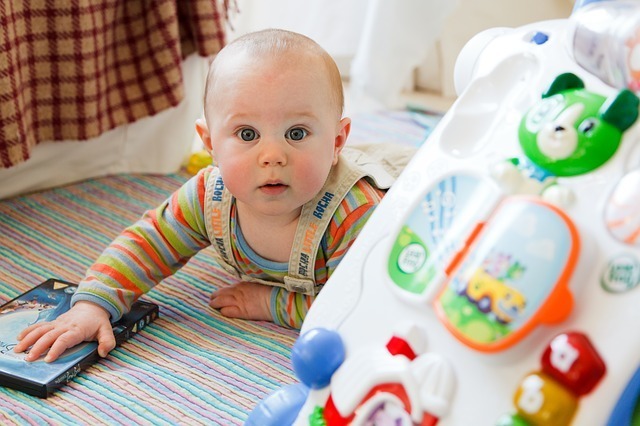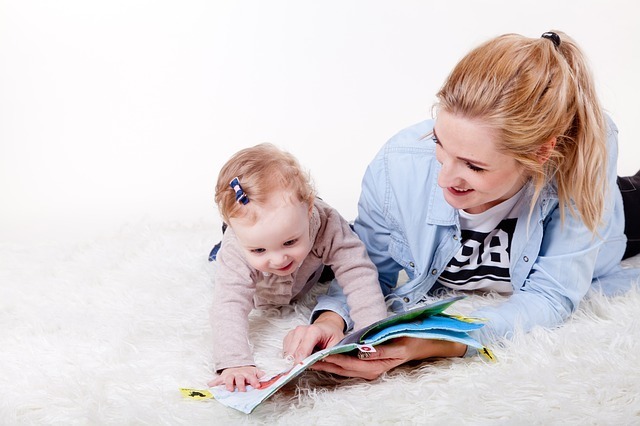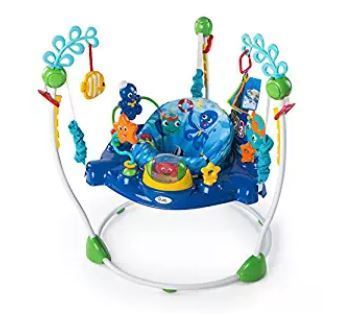8 Tips to Reach Infant Developmental Milestones by Month
Most babies reach their major infant developmental milestones by month with no trouble. However, there are many that still need direction and encouragement from parents.
Whether it’s a cognitive or physical milestone, your child will need a role model to follow as well as gentle encouragement and loads of praise in order to reach all their milestones.
Table of Contents
8 Tips to Reach Infant Developmental Milestones by Month
Here are the tips:
- Practice Tummy Time
- Allow Bouncing with Support
- Encourage Exploration through Play
- Gently Maneuver Your Baby
- Don’t Replace Personal Interaction
- No Baby Talk
- Follow Your Baby’s Cues
- Celebrate Every Little Accomplishment
Practice Tummy Time
 The foundation for all of your baby’s physical development is rooted in neck and back strength, and this cannot be achieved without plenty of tummy time practice. Tummy time strengthens neck and back muscles.
The foundation for all of your baby’s physical development is rooted in neck and back strength, and this cannot be achieved without plenty of tummy time practice. Tummy time strengthens neck and back muscles.
Your baby cannot support their own weight to stand without a strong spine and they cannot see where they’re going in order to crawl or roll if they don’t have a strong neck.
The best way to practice tummy time is with a great play mat, with or without a play gym attached. This gives your baby a safe space to play and practise tummy time without you needing to worry about falls, toxic materials, or dirt that may be found in the rest of your carpet.
Allow Bouncing with Support
Most babies – before they are even ready to sit or roll over on their own – want to start strengthening their leg muscles.
You may sit them on your lap and find that they want to push at something with their feet. They want to stand and bounce on your lap with you supporting them.
This is great practice for strengthening those leg muscles, something that will come in handy when it’s time to start sitting, crawling, or standing on their own.
Of course, your thighs may start feeling a bit sore after a while and your arms may get tired from holding up your chunky little baby.
This is where jumpers can come in handy.A doorway or stationary jumper can be a great way for your little one to exercise their legs without wearing you out. Just make sure they are always within your line of sight
Encourage Exploration through Play

Babies learn quite a bit through free play (Source: Pixabay)
Fine motor skills, as well as cause and effect, are discovered through your child’s playtime. Allow your child to make faces at themselves in the mirror, or let them discover what happens when they squeeze a toy and it crinkles or squeaks. Baby toys that light up may also interest them.
You can also watch as they learn to control their hand movements from batting to achieving the pincer grasp. Their hand-eye coordination will also improve as their eyes focus and they start reaching their target on the first try.
Gently Maneuver Your Baby
Sometimes babies need a bit of help figuring out how to move their bodies and get into the position they want. They do not know what it feels like to roll over or sweep their leg under them to get into a sitting position.
You may need to help them out a little, maneuvering their body to show them how they can accomplish these things on their own.
Try rolling them over gently, helping them get onto their hands and knees, and holding their hands to help them take a few steps. After a few times of showing them how to do it, they may feel a bit more confident and coordinated to do it themselves. There are also suitable toys for babies learning to stand.
Don’t Replace Personal Interaction

Personal interaction is the best way to learn language skills (Source: Pixabay)
With the abundance of educational television shows and mobile game applications, it can be very easy for parents to start relying on these to teach their children some of the basics.
It can also be very easy to place your child in front of the TV so you can have a few minutes to yourself while they’re entertained. These things aren’t necessarily bad or harmful when practiced in moderation, but you shouldn’t use them to replace personal interaction.
The younger your child is, the less they can learn from TV and games. You may be able to understand that they’re being shown shapes, colors, and ABCs, but to babies, screens just look like a lot of flashing lights and overwhelming colors.
You can still use these things to help your child learn, but sit with them and talk about what it is you’re looking at. Repeat everything that is said; point out key things. They will learn much more from hearing your voice then they will from a screen alone.
No Baby Talk
Babies have enough to learn without having to unlearn poor language that they have heard from parents and other adults. While “baby talk” can be cute and funny sometimes, it can actually hinder proper language development in babies and toddlers.
When you don’t use the correct pronunciation of words around your baby or toddler, they will start to say things incorrectly. They don’t know that it’s incorrect; they only know what you’ve taught them.
Eventually, you will need to undo all of the incorrect words they’ve learned to prevent speech impediments and teach them how to speak correctly.
Of course, you don’t need to be super strict on pronunciation at first; babies and toddlers will obviously say some words wrong as they are learning how to talk. You just don’t want them to learn incorrect words directly from you.
Follow Your Baby’s Cues
Many parents may start to worry when they feel like their little ones aren’t reaching their “scheduled” milestones. And while many milestones are typically reached around an average age, you cannot base your child’s progress – or lack thereof – solely on how old they are.
Some babies develop quicker while others are slower. Some skip the crawling phase while others wait to take their first step after they turn a year old. There is nothing wrong with not being average. You may like to check out these toys for babies learning to walk
Most of the time you will be able to tell when your baby is ready to achieve a major milestone. There may be an obvious difference in their interests, activity level, or even physical strength that will tell you they are ready to try something new.
Celebrate Every Little Accomplishment
Children thrive on praise, especially babies and toddlers. They like to know they have done a great job and it encourages them to keep trying.
No matter how small or how big their accomplishment (or attempt) may be, always shower them with praise. Celebrate every accomplishment with them so they know they are moving in the right direction.
To conclude on infant developmental milestones by month
It is important to understand that infant developmental milestones by month may differ for every child. We have to be mindful of not comparing our child to others and let them have the room to grow and reach their individual milestones. Feel free to share your own personal experiences in the comments below.
Hi, I'm Tanya Madsen, a stay at home mother of 3 and a full time blogger. I participate in Amazon affiliate programs and earn a commission when you click over from our site. It won't cost you an extra dime (in fact you'll usually get a discount), so it's a win-win.


